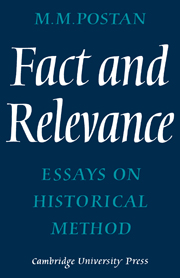Book contents
- Frontmatter
- Contents
- Acknowledgments
- Preface
- 1 Reason in social study
- 2 History and the social sciences
- 3 The historical method in social science
- 4 Function and dialectic in economic history
- 5 Fact and relevance in historical study
- 6 Economic and social history
- 7 Economic growth
- 8 A plague of economists?
- 9 The uses and abuses of economics
- 10 Agriculture and economic development: a lesson of history
- 11 Technological progress in post-war Europe
- 12 A study of history
- 13 Karl Marx: a democrat?
- 14 Hugh Gaitskell: political and intellectual progress
- Index
5 - Fact and relevance in historical study
Published online by Cambridge University Press: 07 October 2011
- Frontmatter
- Contents
- Acknowledgments
- Preface
- 1 Reason in social study
- 2 History and the social sciences
- 3 The historical method in social science
- 4 Function and dialectic in economic history
- 5 Fact and relevance in historical study
- 6 Economic and social history
- 7 Economic growth
- 8 A plague of economists?
- 9 The uses and abuses of economics
- 10 Agriculture and economic development: a lesson of history
- 11 Technological progress in post-war Europe
- 12 A study of history
- 13 Karl Marx: a democrat?
- 14 Hugh Gaitskell: political and intellectual progress
- Index
Summary
Most orthodox historians cling to the belief that their real business is to study facts. The belief testifies to the modesty of their ambitions, but it also betrays some lack of intellectual sophistication, for only men innocent of philosophy will confine the object of historical study to facts, as historians conceive them.
‘As historians conceive them.’ The historians' conception of what historical facts are is not easy to get hold of. In keeping with the traditional unselfconsciousness of their profession, most historians prefer to be unaware of their epistemology. Nevertheless, a critic observing his fellow-historians at close quarters should not find it impossible to lay bare the conception, or rather the several conceptions composing their view of their facts.
In this composition the ingredient most intimately involved with epistemological issues also happens to be the one historians share with workers in many other fields. Whether they realize it or not, historians devoted to ‘facts as they were’ accept by implication the fundamental postulates of philosophical realism. They must presuppose that human knowledge directly corresponds to the objective reality of the world, the Dinge an sich, and can faithfully reproduce it. On this issue their proper alignment should be with the anti-idealists and anti-subjectivists. Outsiders may therefore think it odd that on other fundamental issues the historians most conscious of their allegiance to factual history should be so frequently found siding with the idealist metaphysicians, Hegel, Kant, Rickert, or Dilthey.
- Type
- Chapter
- Information
- Fact and RelevanceEssays on Historical Method, pp. 48 - 64Publisher: Cambridge University PressPrint publication year: 1971



